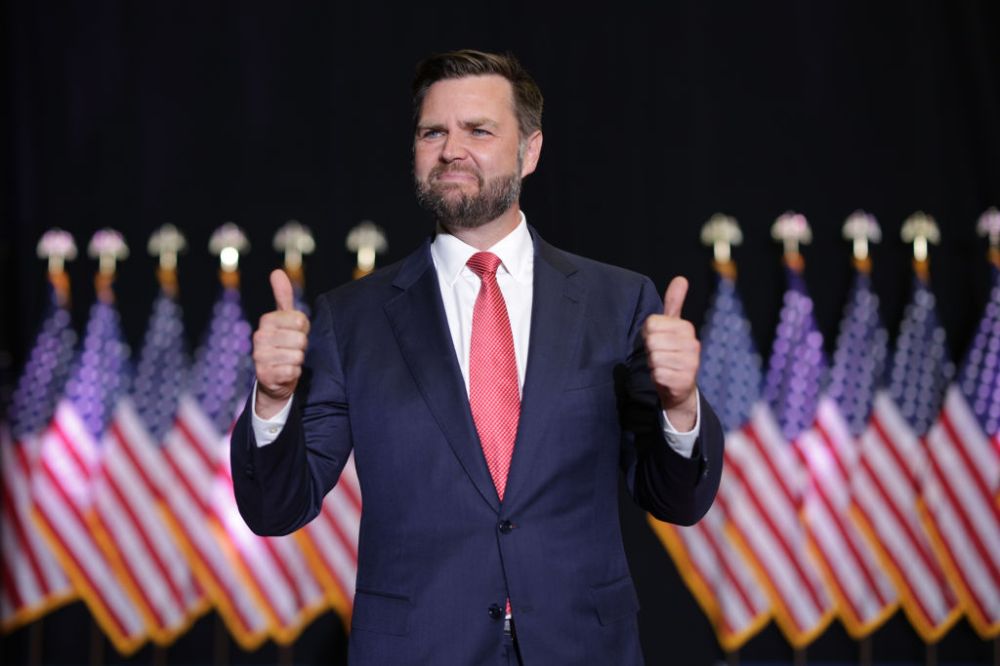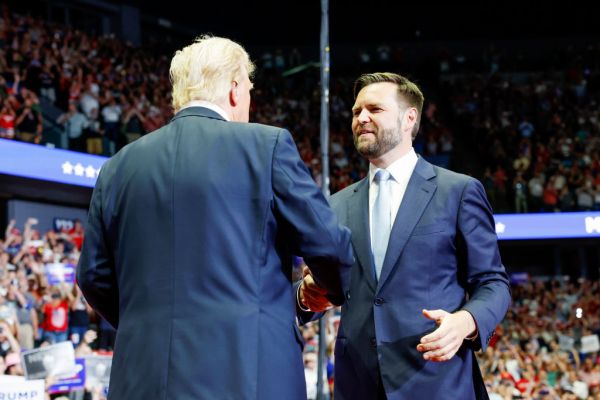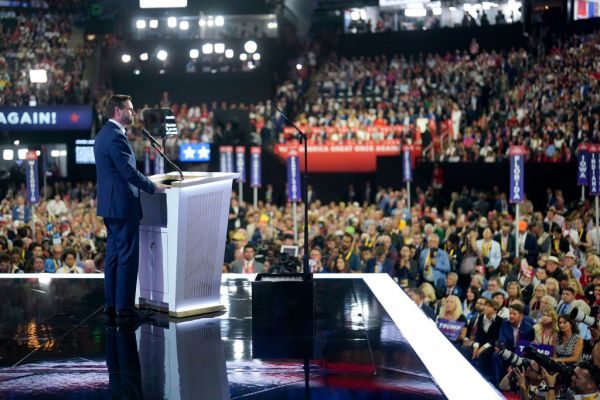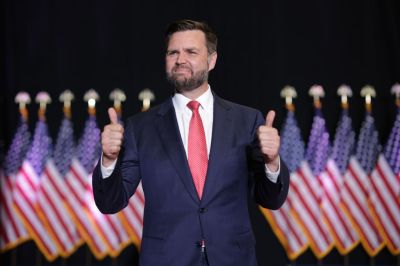I have more in common with J.D. Vance than I’d like to admit.
We attended the same law school. In 2016, we both saw Donald Trump for what he was. We don’t have an ounce of charisma between us. And we’re each waaaaay Too Online.
Being Too Online is unfortunate in a pundit but potentially disastrous in a candidate. The more activist political content you consume, the greater the risk that you’ll misjudge what normal American voters who aren’t Too Online care about.
In my case, that occasionally (or frequently) leads to bad takes. In Vance’s case, it might mean blowing a national election.
If you had told me before the Republican convention that Trump’s party would quickly come to regret nominating Vance for vice president, I would have nodded and said, “Sure, seems plausible.” And I would have been right: There is, apparently, already buyer’s remorse afoot within the GOP a week after Vance joined the ticket.
It’s not all his fault. With Kamala Harris replacing Joe Biden as the Democratic nominee, Republicans are suddenly looking at a tighter race and a different demographic path to 270 electoral votes. Picking Vance “was something of a luxury meant to run up margins with the base in a blowout rather than persuade swing voters in a nail-biter,” The Atlantic’s Tim Alberta reported on Sunday. An unnamed House Republican told Axios earlier this week that, with Harris now at the top of the Democratic ticket, the Vance pick “doesn’t add much” and “the capacity to have expanded the map a little bit ... would have been much more beneficial.”
Choosing a running mate who appeals to precisely the same voting blocs that Trump already appeals to is something you do when the election is in the bag, not when you have a fight on your hands. In hindsight, a—ahem—“DEI hire” like Marco Rubio or Tim Scott might have been more electorally fruitful.
But some of the buyer’s remorse is about Vance specifically. He’s awkward on the stump. Voters seem to instinctively not like him. According to Punchbowl News, nearly 80 percent of Republican staffers and lobbyists interviewed at last week’s convention disapproved of him as the VP pick. To borrow a line from Minnesota’s Democratic Gov. Tim Walz, Vance is simply a weird guy in a party that’s teeming with them.
Even some of his fans in Moscow have apparently developed misgivings about him as their initial euphoria about his selection has faded.
I would have predicted that Vance’s great liability on the national ticket would be his blatant contempt for the constitutional order or his callousness toward Ukraine and cynical justifications for it. But because I’m Too Online and out of touch with normal Americans, I would have been wrong.
J.D. Vance’s big problem with voters is shaping up to be “childless cat ladies.”
Modern America has a lot of them, you know. Including one who’s about to become the Democratic nominee for president.
Callousness, as usual.
Worrying about childlessness in and of itself doesn’t make you Too Online. That’s a serious national concern. A country that no longer reproduces enough to replace its population is destined for stagnation, instability, and fiscal crisis. Some American allies are already staring down the barrel of it.
America itself isn’t far behind.
What makes you Too Online is reducing a phenomenon as sensitive and complicated as childlessness to brain-dead culture-war demagoguery about “childless cat ladies who are miserable at their own lives and the choices that they’ve made, and so they want to make the rest of the country miserable too.”
That was J.D. Vance in 2021. This was also J.D. Vance in 2021, endorsing Demeny voting, a proposal that would give more weight to the votes of parents on behalf of their children:
His logic in both soundbites is similar. Not only should we presume that all childless Americans care less about the future of the country than all American parents do, we should impose civic disabilities on them because of it. The power of their votes should be diluted by granting extra ballots to those with children. And voters should regard them as unfit to serve responsibly in public office because they lack the same “direct stake” in the country that parents have.
Vance said this, mind you, surely knowing that George Washington himself had no biological children. The father of our country somehow managed to father our country despite having fathered nothing else. The closest he came to children of his own was being a step-parent. Just like “childless cat lady” Kamala Harris.
The same is true of the most influential right-wing reactionary in American politics since George Wallace and before Donald Trump. That would be Pat Buchanan, of course, who’s regarded as a sort of intellectual godfather to Trumpism. No kids.
There’s a lot that’s irksome about Vance’s attempt to divide America into tribes of parents and “cat ladies” but we can start with the obvious: It’s shockingly callous, even by the gutter standards of populist-nationalist chuds.
After all, not everyone is childless by choice. Social media is filled this week with stories from hopeful parents who had their dreams dashed by tragedy. Some suffered miscarriages; some had bad luck with IVF; some didn’t meet the right person before their window for having children closed. Last year, in a piece for the Institute for Family Studies, one author recalled being told by a CDC researcher that no less than 80 percent of women of childbearing age plan or hope to have children someday. Many won’t get their wish.
Should we treat them as unfit for office because of it? What about parents whose children died in childhood, leaving them untethered to America’s future?
Of course not, Vance would say—and did say. I was referring to people who are childless by choice. But his point about parents having a “direct stake” in America’s future should make the cause of childlessness irrelevant. If the problem with not having kids is that it leaves one with less motivation to ensure that the United States remains a country worth inheriting, the reason for not having them shouldn’t matter. He’s making an incoherent exception for those who aren’t childless by choice simply to reduce the callousness of his position.
And what about those who are childless by choice because their personal pursuit of happiness led them to prioritize a career over child-rearing? They’re proud of their success, as they should be, yet now find themselves being mocked for their choices as “cat ladies.” Imagine working hard to achieve the American dream only to be told by the vice presidential nominee for one of the two major parties that you’re “miserable” and “want to make the rest of the country miserable too.”
It’s ugly, but it’s characteristic. Nationalism is a tribal ideology and tribes don’t much care what individuals want.
Sneering at “childless cat ladies” isn’t the sort of thing a smart, ambitious young politician does on national television if he’s looking for ways to build goodwill among the general electorate. It’s the sort of thing he does if he’s a Too Online populist edgelord eager to ingratiate himself to a claque of like-minded reactionaries.
The New Right’s agenda.
It’s not an accident that Vance pushed his message on Tucker Carlson’s show, as childlessness has become a hobby horse of nationalist ideologues.
Tucker himself accused uber-hawk Lindsey Graham earlier this year of supporting Ukraine’s defense because Graham has no children. A few days ago, after Kamala Harris replaced Joe Biden at the top of the ballot, populist influencer Will Chamberlain declared that “the 2024 election is really parents vs. the childless.”
That the race would turn instantly into a referendum on parenthood the moment a Democrat with several children was replaced by one with none goes to show how opportunistic the critique is, even among people who purport to take it seriously. There’s nothing in Harris’ program that suggests she’d be more or less hostile to parents as president than Biden, but attacking her for it is an easy way to signal to a right-wing tribe of traditionalists that she’s not One Of Us.
Another example: The closest thing Vance has to a kindred spirit in politics is failed Senate candidate turned House candidate Blake Masters, a fellow recipient of tech billionaire Peter Thiel’s largesse in 2022. This week, Masters rode to Vance’s defense on the alleged perils of childlessness. “Political leaders should have children. Certainly they should at least be married,” he wrote. “If you aren’t running or can’t run a household of your own, how can you relate to a constituency of families, or govern wisely with respect to future generations? Skin in the game matters.”
Maybe Masters believes that. But even if he doesn’t, he has an obvious and urgent electoral motive to want Republican voters to view childless candidates with suspicion. Abe Hamadeh, his primary opponent, doesn’t have a wife or kids. He’s not One Of Us.
Defining “Us” is the chief preoccupation of nationalism, and an “Us” that believes America can be made great again only by reversing 60 years of cultural liberalization naturally resents seeing women forgo motherhood for work. Vance’s emphasis on childless cat “ladies” is a tell in that regard: He didn’t need to gender his critique, as his complaint about childless people not having a stake in America’s future applies equally well to men. But it’s not men whose childlessness so offends revanchist traditionalists, is it?
Insofar as nationalists see men diminished by childlessness, the idea seems to be that it calls their masculinity into question. Vance singled out Pete Buttigieg, a gay man, as an example of a childless male leader during his 2021 interview with Carlson, never mind that Buttigieg and his husband were in the process of trying to adopt at the time. Carlson singled out Graham, whose bachelor status has long been chum for the D.C. rumor mill, in his critique of Russia hawks even though many members of Congress who support Ukraine have children.
Again, if you view the right’s objection to childlessness mainly as a form of traditionalist tribal signaling, it makes sense that men whom they regard as effete would be prime targets for it.
Their contempt for the childless also has an element of blood-and-soil nationalism lurking in it, unsurprisingly. Many populists accuse Democrats of a plot to replace “real Americans” with third-worlders en masse in order to remake the country demographically. That leaves them in a race of sorts with the usurpers to establish control of the United States, and that race can’t be won by securing the southern border alone. The enemy will need to be outbred as well, and the childless among us aren’t pulling their weight.
J.D. Vance can be safely excluded from the cohort that believes in an American “volk,” but some of his new constituents unfortunately cannot.
Still, the most incisive criticism I’ve seen of right-wing fulmination about childlessness came from my former Dispatch colleague, Andrew Egger. “I am extremely pronatalist,” he wrote earlier this week, “but it is not lost on me that a significant reason pronatalism has caught fire on the right these days is because ‘have kids’ is the only real ‘family value’ a movement headed by philandering freaks like Trump and Elon Musk can carry forward.”
In virtually every way, from moderating on abortion to inviting adult models to speak at the national convention to whatever the hell this is, Trump’s Republican Party is less “family oriented” than what preceded it. In fact, the member of the party most closely associated with family values happens to be the member most widely despised by the base. That would be Mitt Romney, whose (very!) large and loving family has earned him zero credibility among populists as a man fit to lead.
Treating parenthood as some special qualification for civic responsibility is nationalists’ way of compensating for the right’s Trumpian drift away from wholesomeness. True to form, instead of simply celebrating the virtues of having children, their critique is framed mainly as a reason to distrust and delegitimize their political enemies. It’s entirely in character for them to treat a serious problem like falling birth rates as a lowbrow pretext to try to morally disqualify liberals like Kamala Harris from office.
Needless to say, if Donald Trump were childless, types like Vance would never have dared to suggest that parenthood is a necessary qualification for office. They’d be comparing Trump to George Washington, or admiring his virility in refusing to be tied down while boinking his way across Manhattan.
In the end, if nationalism’s interests diverge from the cult’s, nationalism must yield. Even for the “serious” intellectuals in the movement.
A backlash or not?
I doubt that any of this will matter much to the campaign, though.
That’s not (just) because my opinion of American voters is as low as it can get. It’s because the backlash to Vance’s “childless cat lady” remarks will be concentrated among single women, and most single women are already voting Democratic.
But who knows? Having the GOP vice presidential nominee on camera evincing contempt for childlessness could add some oomph to Democratic attacks on red-state abortion bans and conservative skepticism of IVF. “Republicans hate women having freedoms!” might ring a little truer to undecided voters with Vance babbling about how not having kids should render you a second-class citizen.
It’s also an uncomfortable fact for the right that the most popular woman in America, worshiped by tens of millions of adoring fans, is herself a childless cat lady who may yet have something to say about the election. Maybe that won’t matter. Maybe it will.
But I hope there is a backlash to what he said, and not just because I want Vance and his running mate to lose. Or because it’d be really funny to see J.D.’s years of desperate sycophancy in search of power end with Trump scapegoating him ruthlessly for the defeat.
I want to see a backlash because I resent being told by an authoritarian bootlicker like J.D. Vance that he cares more about the future of America than I do, and for no reason grander than biological happenstance. I’ve spent nine years arguing daily against Trumpism because I care about America’s future; I don’t need to have a “direct stake” in it to know that it’ll be brighter under liberalism, as classically understood, than under whatever he and Trump have planned.
Someday, perhaps, after the populist threat has passed, his kids will thank me for my effort to see him defeated. And if they don’t, they’re welcome anyway.
Patriotism, not accidents of procreation, is why Americans have a stake in America’s future. It doesn’t surprise me that nationalists would struggle to relate.







Please note that we at The Dispatch hold ourselves, our work, and our commenters to a higher standard than other places on the internet. We welcome comments that foster genuine debate or discussion—including comments critical of us or our work—but responses that include ad hominem attacks on fellow Dispatch members or are intended to stoke fear and anger may be moderated.
With your membership, you only have the ability to comment on The Morning Dispatch articles. Consider upgrading to join the conversation everywhere.